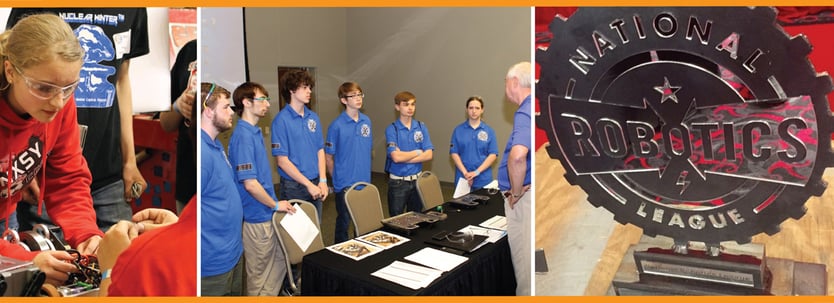Attracting and Building Manufacturing’s Future Workforce
Posted on July 02, 2021 by Steven Tamasi
Every day, industry publications and emails include stories about the growing effect of the skills gap on the US manufacturing community. We are bombarded with tales of how this program or that program has managed to get a handful of students to consider manufacturing as a career pathway. Just like any issue that we are constantly hit over the head with, we sometimes start to tune it out.
I am asking that before you tune it out, look at the facts below:
- A shortage of 2.4 million manufacturing workers by 2028
- Currently 600,000–1,000,000 open jobs in manufacturing
- 97 percent of precision metal forming and metalworking companies are reporting at least one skilled job opening
- Manufacturing companies lose 11 percent in profits due to increased overtime expenditures
- 64 percent of high school students will pick their career pathways based on interests and experiences
- Workforce development is the number one issue facing manufacturing companies
I am sure that you have heard these stats before. It might be hard to think how this is affecting your company directly. Here is a way to bring it home. Look at your shop floor and imagine what your company performance would be if you lost 53 percent of your employees right now. Well, you will lose 53 percent of them by 2028. Think of the impact that it will make on your ability to bring in new business if you cannot replace them, let alone service your current customer base. These stats are the cold hard truth, and they are not going away anytime soon.
With the Baby Boomer “silver tsunami” brewing, many are debating how to counteract it. Associations, corporate foundations, and government organizations are investing heavily in outreach programs, scholarships, websites, and marketing materials to appeal to and convince this next generation that manufacturing is a viable career option with a bright future. A four-year college degree may not be the best path for all and presenting an alternative with opportunity for growth is essential.
In the end, the answer to this problem is not in the hands of any association, corporate foundation, or government organization. It is in the hands of each and every manufacturing company. The only way to solve the skills gap is for manufacturing companies to connect with our youth and convince them that our companies can provide great, rewarding careers. It is critical for all of us to utilize the resources in front us to solve our own individual workforce development issue.

At Boston Centerless, we have been at the forefront of this dilemma, investing our time and financial support with the National Robotics League (NRL). The NRL is a manufacturing workforce development program of the National Tooling & Machining Association (NTMA), where students design and build remote-controlled robots (Bots) to face off in a gladiator-style competition. Through the manufacturing process of Bot building, students’ imaginations are captured as they design, build, and compete with their own robotic creations. Through this hands-on effort—along with industry partnerships—students gain practical knowledge of Science, Technology, Engineering, and Math (STEM), all essential skills for manufacturing.
By formalizing ties between schools or youth organizations and manufacturing partners, students gain a better understanding and become enthusiastic about the career possibilities in manufacturing. Also, manufacturers are able to build valuable industry-school connections and workforce talent pipelines by helping these teams engineer a lean, mean, fighting machine. In other words, everybody wins.
The NRL provides a national structure for educational robotics competitions for the purpose of increasing the pipeline into manufacturing-related career opportunities and to provide manufacturing companies with a program that invigorates and grows their organizations. Qualifying regional robotic programs join the NRL, which offers a fair, safe, and cost-effective environment from which to build, design, and compete.
Student teams compete regionally so that they can test their robotic creations and battle for local supremacy. The NRL National Competition is held in May each year. Teams not only earn points for their arena battles, but they are also evaluated by industry experts on their engineering binder. Each team presents its documentation binder, and both the content as well as the presentation are awarded points heavily weighted towards the crowning of the National Competition’s Grand Champion.
The competitions are something that the students can get excited about, but in actuality, they are developing technical skills in mechanical and electrical engineering, machining and welding, along with 21st century skills in critical thinking, project management, communication, and teamwork. These competitions are also the ideal reverse career fair. They showcase the best and brightest potential new hires for the manufacturing industry, and you can be there recruiting for your company. Getting involved with an NRL program allows you to be proactive in engaging the students that you want instead of waiting for them to find you amongst a crowded field of opportunities.
Now, take one more look around your facility. How many of your current employees are going to be working for you in five years? In 10 years? In 20 years? Then, look around the community that surrounds your shop. How many students are within 5, 10, and 20 miles of your shop? The NRL acts as the hook that attracts smart, capable students who love to build things and solve problems. Exactly the type of people whom we hope will make up the next generation of manufacturing leaders. Wouldn’t it be great to utilize a program like the NRL to have the opportunity to engage such students in a fun program that will help them to learn the skills that you need in your future workforce? We have the ways to make it happen; you just need to be ready to launch.
To learn more about the NRL, visit www.gonrl.org or feel free to contact Bill Padnos at bpadnos@ntma.org.
